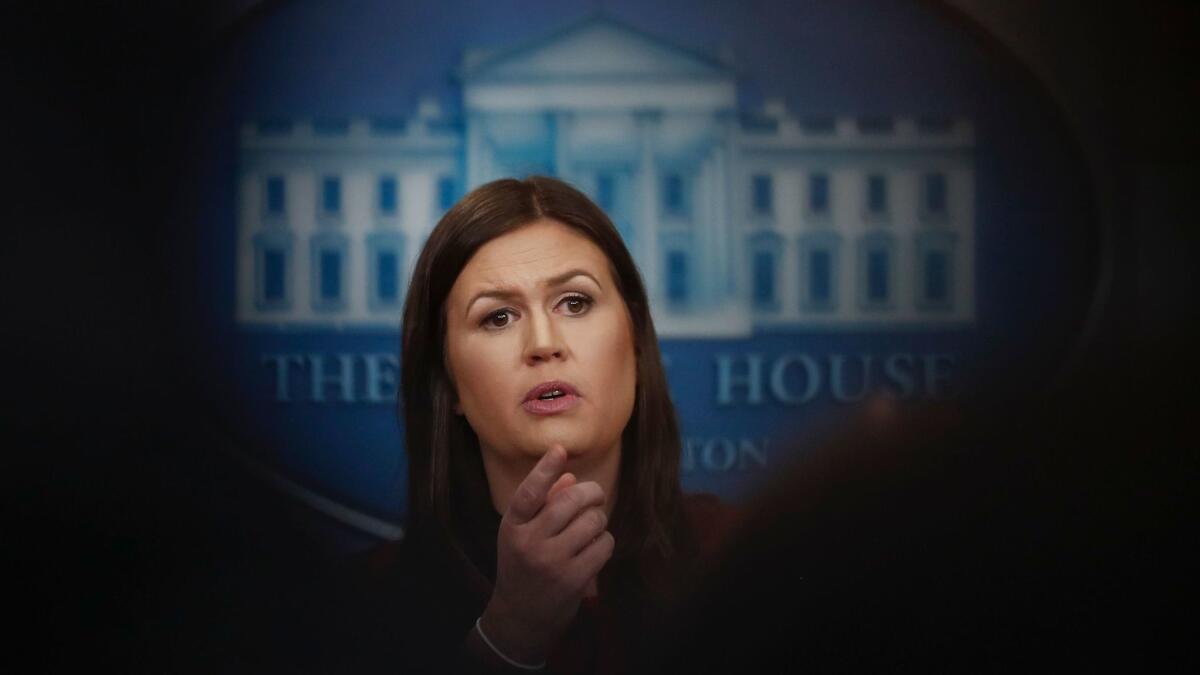Op-Ed: The Jemele Hill controversy portends a world stripped of our culture of free expression

White House Press Secretary Sarah Huckabee Sanders pounced on ESPN anchor Jemele Hillâs tweet calling President Trump a white supremacist. The tweet, she said, was a âfireable offense.â While outrage is surging on all sides, Sandersâ intemperate use of her White House podium should not come as a big surprise. The kind of harsh private punishment for speech that Sanders called for is now commonplace.
Days ago, the University of Oregon fired Matthew Halls, the director of its Bach Festival. Though the university denies it, a festival performer claims that Halls was dismissed for a joke, told privately, that was misunderstood as racist. This summer, media commentator Lisa Durden was fired by Essex College in New Jersey for defending a black-only event on Fox News, saying âyou couldnât use your âwhite privilegeâ card to get in.â At Harvard University, 10 incoming freshman saw their acceptances revoked after they shared offensive memes in a closed Facebook group. In June, CNNâs series âThe Believerâ was abruptly canceled after its host, religion expert Reza Aslan, fired off a foul-mouthed tweet criticizing Trump. Most of those terminated were stunned. The red lines they crossed were less red than gray â unarticulated and indistinct until after the fact. In several cases, the outcomes were far in excess of sanctions imposed in similar past instances.
Recent harsh punishments for speech can only inspire college students, television commentators and all of us to think twice before saying something that might offend, jeopardizing our culture of free expression.
Donât get me wrong: Conscientiousness is a good thing. After television host Bill Maher got into hot water for using the n-word on-air, rapper Ice-T dubbed the incident a âteachable moment.â Harvard students should avoid promoting racist and sexist jokes and television hosts should eschew slurs. The rise of hate groups, due to divisive rhetoric and Trump administration policies, has made it more important than ever to avoid language that can fan animosity.
Opaque and selective enforcement of ill-defined limitations on speech is a mainstay in authoritarian settings.
But when indeterminate gray lines govern speech subject to draconian sanctions, they can deter more than menacing rhetoric. Nowadays opining on a wide range of subjects â the president, race, gender, privilege â can trigger alarm bells and outrage. Prudence may counsel avoiding sensitive terrain entirely, leading to a soft form of self-censorship that narrows our discourse and prevents necessary conversations on tough topics.
Opaque and selective enforcement of ill-defined limitations on speech is a mainstay in authoritarian settings. China scholar Perry Link has said, âClarity serves the purpose of the censoring state only when it wants to curb a very specific kind of behavior; when it wants to intimidate a large group, vagueness works much better.â Russian columnist Maria Snegovaya describes repression implemented âon a selective basis, targeting certain media outlets or individuals in order to motivate self-censorship among the rest.â
There are, of course, essential differences between a stateâs deliberate capriciousness aimed to chill speech writ large, and numerous independent entities with varied motivations making case-by-case decisions. Private universities and media organizations are not subject to 1st Amendment prohibitions on censoring speech. They are, however, among the institutions in civil life that profess the values of free expression and the exchange of ideas; harsh punishments for expression that does not violate laws against harassment, threats or incitement to violence must be weighed against this commitment.
Private institutions should at the very least be up front about what they expect and from whom. But neither Harvard nor CNN have explained their decisions to punish speech, while Essex College allegedly told Durden she was fired because she had improperly identified herself as an Essex professor on the show (she didnât).
When the statements in question are out in the open, obscuring the logic behind their consequences can have perverse results. In the case of CNN, particularly since Aslan quickly apologized for his indiscretions, some supporters opined that his swift ouster could only be explained by racism or anti-Muslim sentiment. Others chalked up the result to virulent conservative outcry, accusing the network of bowing to pressure. Openness about the reasoning and analysis behind institutional decisions would help bring clarity, avoid nefarious inferences and help people understand the rules at play.
At a time when offensive speech goes viral and society seems to revel in seeing powerful personalities and organizations laid low, leaders may feel inclined to cauterize controversies through decisive, even scorching action. But harsh, irreversible punishments for speech cause collateral damage, instilling fear in all of us that saying the wrong thing â even in jest or in private â may be our undoing. This zero-tolerance approach to offense, where one strike may mean youâre out, fosters a culture of caution and âgotchaâ attacks that are inimical to open discourse.
When particular words reflect a pervasive pattern of offensive views evinced by a speaker, thatâs one thing. When someone strays across hard-to-discern gray lines just once, institutions would do well to consider whether remorse, recompense and remediation are viable alternatives to expulsion. While greater leniency toward expression may mean that an institution takes more heat in the short term, it can also avoid casting a lasting chill on speech.
Suzanne Nossel is the executive director of Pen America.
Follow the Opinion section on Twitter @latimesopinion or Facebook
More to Read
A cure for the common opinion
Get thought-provoking perspectives with our weekly newsletter.
You may occasionally receive promotional content from the Los Angeles Times.










